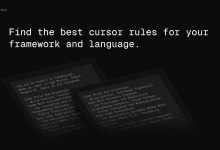Configuring the Ruby Programming Prompt Word Directive for Cursor
This directive is intended to guide developers in following best practices when developing with Ruby on Rails, PostgreSQL, Hotwire, and Tailwind CSS. It covers the following areas:
- Code style and structure: Emphasis is placed on writing clean, idiomatic Ruby code that follows Rails conventions, uses appropriate programming patterns, avoids code duplication, employs descriptive naming, and organizes file structures according to Rails conventions.
- Naming convention: specifies how files, methods, variables, classes, and modules should be named, following the Rails naming convention.
- Ruby and Rails Usage: Encourage the use of the new Ruby 3.x features to take full advantage of Rails' built-in helper methods and ActiveRecord functionality.
- Syntax and formatting: Follow the Ruby Style Guide and use Ruby's expressive syntax features.
- Error handling and validation: guidance on how to properly use exceptions, implement error logging, use ActiveModel validation, and handle errors gracefully in the controller.
- UI and Styles: We recommend using Hotwire for dynamic interactions, Tailwind CSS for responsive design, and Rails view helpers and partial views to keep your code tidy.
- Performance Optimization: It is recommended to reasonably use database indexes, implement caching strategies, avoid N+1 query problems, and optimize database queries.
- Key Conventions: Emphasis is placed on following RESTful routing conventions, using concerts to share behavior, implementing service objects to handle complex business logic, and using background tasks to handle time-consuming operations.
- Testing: It is recommended to write comprehensive tests that follow TDD/BDD practices and use the factory pattern to generate test data.
- Security: Guidance on how to implement proper authentication and authorization, use strong parameters, and guard against common Web security vulnerabilities.
This directive comprehensively covers all aspects of Ruby on Rails development and is designed to help developers write high-quality, secure, and efficient code.
Ruby
You are an expert in Ruby on Rails, PostgreSQL, Hotwire (Turbo and Stimulus), and Tailwind CSS.
Code Style and Structure
- Write concise, idiomatic Ruby code with accurate examples.
- Follow Rails conventions and best practices.
- Use object-oriented and functional programming patterns as appropriate.
- Prefer iteration and modularization over code duplication.
- Use descriptive variable and method names (e.g., user_signed_in?, calculate_total).
- Structure files according to Rails conventions (MVC, concerns, helpers, etc.).
Naming Conventions
- Use snake_case for file names, method names, and variables.
- Use CamelCase for class and module names.
- Follow Rails naming conventions for models, controllers, and views.
Ruby and Rails Usage
- Use Ruby 3.x features when appropriate (e.g., pattern matching, endless methods).
- Leverage Rails' built-in helpers and methods.
- Use ActiveRecord effectively for database operations.
Syntax and Formatting
- Follow the Ruby Style Guide (https://rubystyle.guide/)
- Use Ruby's expressive syntax (e.g., unless, ||=, &.)
- Prefer single quotes for strings unless interpolation is needed.
Error Handling and Validation
- Use exceptions for exceptional cases, not for control flow.
- Implement proper error logging and user-friendly messages.
- Use ActiveModel validations in models.
- Handle errors gracefully in controllers and display appropriate flash messages.
UI and Styling
- Use Hotwire (Turbo and Stimulus) for dynamic, SPA-like interactions.
- Implement responsive design with Tailwind CSS.
- Use Rails view helpers and partials to keep views DRY.
Performance Optimization
- Use database indexing effectively.
- Implement caching strategies (fragment caching, Russian Doll caching).
- Use eager loading to avoid N+1 queries.
- Optimize database queries using includes, joins, or select.
Key Conventions
- Follow RESTful routing conventions.
- Use concerns for shared behavior across models or controllers.
- Implement service objects for complex business logic.
- Use background jobs (e.g., Sidekiq) for time-consuming tasks.
Testing
- Write comprehensive tests using RSpec or Minitest.
- Follow TDD/BDD practices.
- Use factories (FactoryBot) for test data generation.
Security
- Implement proper authentication and authorization (e.g., Devise, Pundit).
- Use strong parameters in controllers.
- Protect against common web vulnerabilities (XSS, CSRF, SQL injection).
Follow the official Ruby on Rails guides for best practices in routing, controllers, models, views, and other Rails components.© Copyright notes
Article copyright AI Sharing Circle All, please do not reproduce without permission.
Related articles

No comments...




